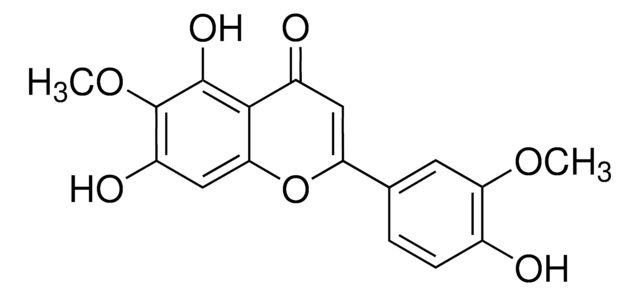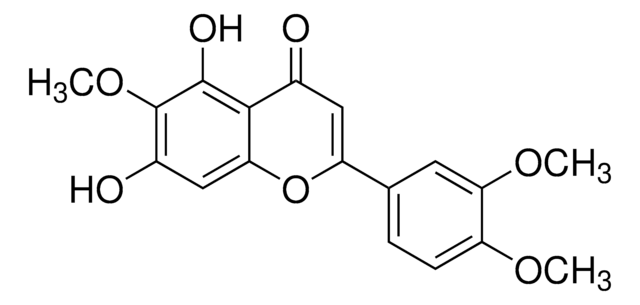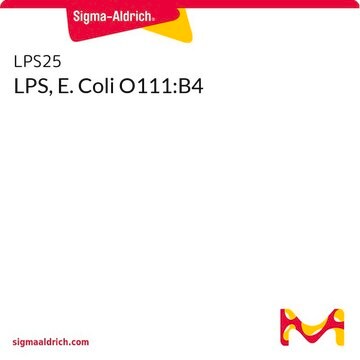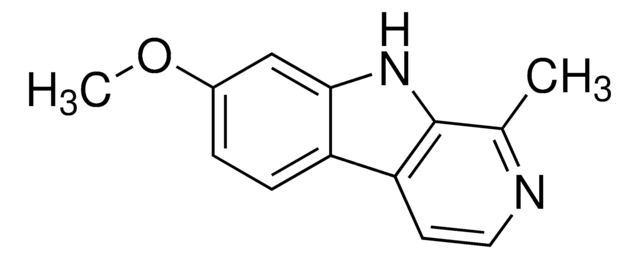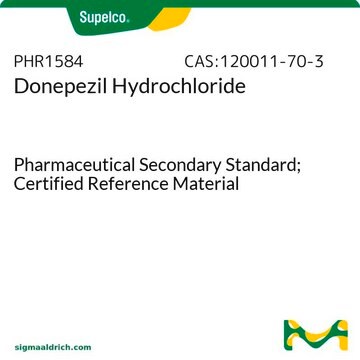This product has not been analyzed for stability with repetitive freeze thaw cycles. Kindly generate aliquots to avoid product failure caused by repeated freezing and thawing.
SML1689
Eupatilin
from (Isolated from Artemisia sp.), ≥98% (HPLC), powder, lipophilic flavonoid
同義詞:
2-(3,4-Dimethoxyphenyl)-5,7-dihydroxy-6-methoxy-4H-1-benzopyran-4-one, 5,7-Dihydroxy-3′,4′,6-trimethoxyflavone, NSC 122413
登入查看組織和合約定價
全部照片(1)
About This Item
經驗公式(希爾表示法):
C18H16O7
CAS號碼:
分子量::
344.32
MDL號碼:
分類程式碼代碼:
12352200
PubChem物質ID:
NACRES:
NA.77
暫時無法取得訂價和供貨情況
推薦產品
產品名稱
Eupatilin, ≥98% (HPLC)
生物源
(Isolated from Artemisia sp.)
品質等級
化驗
≥98% (HPLC)
形狀
powder
儲存條件
desiccated
protect from light
顏色
white to beige
溶解度
DMSO: 20 mg/mL, clear
儲存溫度
−20°C
SMILES 字串
O=C1C=C(C2=CC=C(OC)C(OC)=C2)OC3=CC(O)=C(OC)C(O)=C31
InChI
1S/C18H16O7/c1-22-12-5-4-9(6-14(12)23-2)13-7-10(19)16-15(25-13)8-11(20)18(24-3)17(16)21/h4-8,20-21H,1-3H3
InChI 密鑰
DRRWBCNQOKKKOL-UHFFFAOYSA-N
尋找類似的產品? 前往 產品比較指南
應用
Eupatilin has been used to investigate its inhibitory effects on intracranial hemorrhage (ICH)-induced inflammation and its anti-inflammatory mechanisms in mouse BV2 cells, in vitro.[1] It has also been used as a standard for its quantitative estimation in Artemisia extracts by microcolumn high performance liquid chromatography with diode array (HPLC-DAD) assay.[2]
生化/生理作用
Eupatilin is a flavone with anti-oxidative, anti-inflammatory, and anti-cancer properties.
Eupatilin is an important constituent in the leaves of Artemisia argyi and also an active component of DA-9601.[3] It exhibits anti-apoptotic effects. Eupatilin provides protection against tumor necrosis factor α (TNF-α)-mediated inflammation in human umbilical vein endothelial cells.[1] It is used in the treatment of gastritis and peptic ulcers.[3] Eupatilin safeguards gastric epithelial cells from oxidative damage and smooth muscle cells from indomethacin-induced cell damage. Eupatilin lowers bile acid-stimulated hepatocyte apoptosis.[4]
Flavone with anti-oxidative, anti-inflammatory, and anti-cancer properties
儲存類別代碼
11 - Combustible Solids
水污染物質分類(WGK)
WGK 3
閃點(°F)
Not applicable
閃點(°C)
Not applicable
從最近期的版本中選擇一個:
分析證明 (COA)
Lot/Batch Number
Yawei Wang et al.
Molecular medicine reports, 13(2), 1141-1146 (2015-12-18)
Eupatilin, one of the major flavonoids in Artemisia asiatica Nakai (Asteraceae), has been reported to possess antitumor properties. However, thus far there have been no reports regarding the effects of eupatilin on glioma. Therefore, in the current study the effects
Eupatilin inhibits lipopolysaccharide-induced expression of inflammatory mediators in macrophages
Choi EJ, et al.
Life Sciences, 88(25-26), 1121-1126 (2011)
Bioactive phenolics of the genus Artemisia (Asteraceae): HPLC-DAD-ESI-TQ-MS/MS profile of the Siberian species and their inhibitory potential against alpha-amylase and alpha-glucosidase
Olennikov DN, et al.
Frontiers in Pharmacology, 9, 756-756 (2018)
Eupatilin attenuates the inflammatory response induced by intracerebral hemorrhage through the TLR4/MyD88 pathway
Fei X, et al.
International Immunopharmacology, 76, 105837-105837 (2019)
Antonia Wiegering et al.
Molecular biology of the cell, 32(8), 675-689 (2021-02-25)
A range of severe human diseases called ciliopathies is caused by the dysfunction of primary cilia. Primary cilia are cytoplasmic protrusions consisting of the basal body (BB), the axoneme, and the transition zone (TZ). The BB is a modified mother
-
Peut on congeler et décongeler plusieurs fois l'eupatilin sans affecter son activité ?
1 answer-
Helpful?
-
Active Filters
我們的科學家團隊在所有研究領域都有豐富的經驗,包括生命科學、材料科學、化學合成、色譜、分析等.
聯絡技術服務